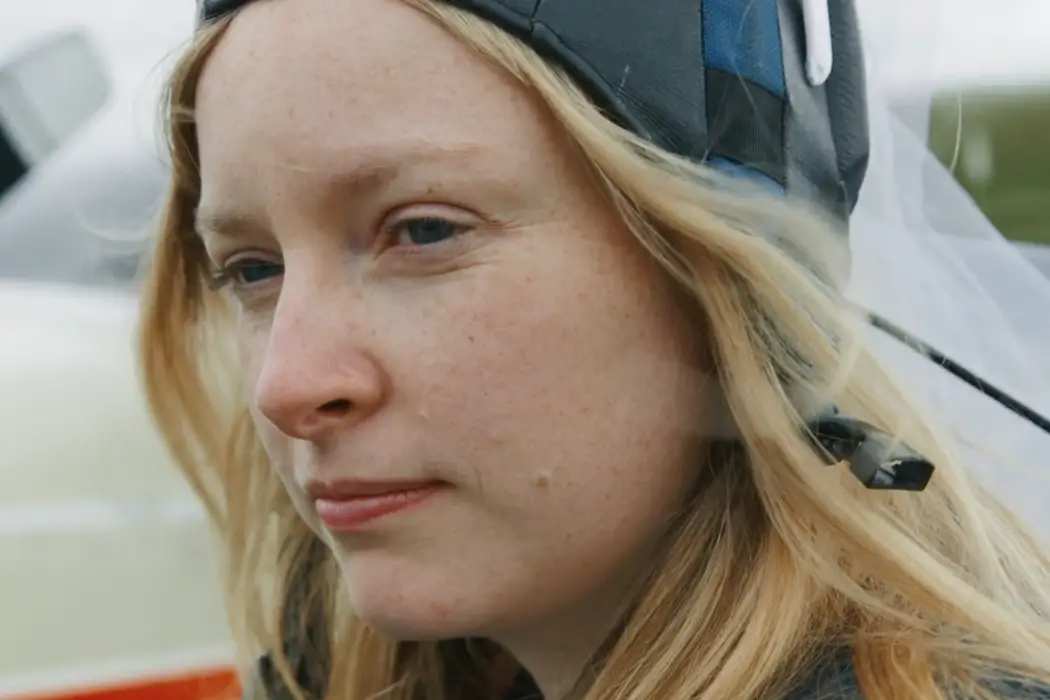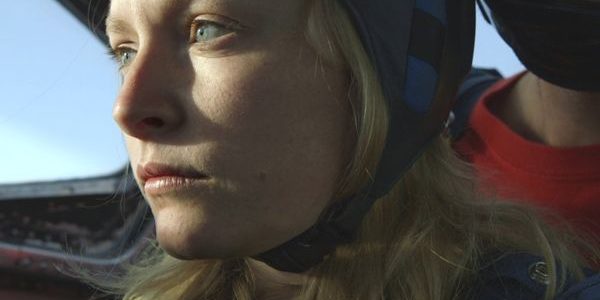Berlinale 2020: ANNE AT 13,000 FT

Wilson is a cinema enthusiast based out of Toronto, Canada.…
Capturing the mundane nuances of urban/suburban life doesn’t always make for the most compelling cinema. But when it’s done right, these types of cinematic narratives can become exhilarating experiences that tug right into our humanistic tendencies by threading the line between reality and fiction. Kazik Radwanski does exactly that with Anne at 13,000 ft. It’s not the most exciting of films, but it’s certainly a striking effort worthy of thoughtful consideration.
Set in the beautiful urban neighbourhoods of Toronto, the film revolves around Anne (Deragh Campbell), a daycare worker who attempts skydiving for the first time at the start of the film. Although never overtly identified, it’s clear from the very beginning that Anne suffers from some type of anxiety disorder, which clearly affects both her personal and professional life. Jumping off from her desire and interest in skydiving, the film continues to leap across emotional boundaries as it explores Anne’s self-destructive personality in the most compelling way.
An anchoring lead performance
It’s hard to comment about Anne at 13,000 ft without acknowledging the powerhouse performance of its lead actress. Campbell continues to emerge as a rising star in the Canadian film industry, and the way she commands the screen is quite remarkable. She’s literally in every scene of the film, yet despite how mentally exhaustive her character is, Campbell manages to subdue any emotional outbursts until the exact right moments. Her portrayal of Anne is actually quite reserved, but she’s able to always hint at the character’s problematic internal dialogue. Somehow, she manages to capture repressed social and emotional angst in both a clear and subtle way.
Maintaining a heightened sense of realism
The same type of praise could be said of Radwanski, whose work is definitely something to look out for in the years to come. With Anne at 13,000 ft, he proves himself to be an extremely competent and assured filmmaker, and clearly has a strong sense of what he wants. In exploring Anne’s rather destructive path in life, he never takes any short cuts and always follows through with a heightened sense of realism. The film almost feels like a documentary, but retains enough cinematic qualities to remind viewers of its narrative medium.

As an example, there’s a scene in the film when Anne’s self-destructive properties come into full fruition during a seemingly benign encounter with her family. She decides to bring her current boyfriend home for dinner, and despite achieving this sense of normalcy that she’s been yearning for, Anne lashes out at everyone in a manner that naturally builds up into a socially cataclysmic event. But what’s interesting is that Anne’s actual outburst doesn’t feel overdramatic at all, despite the circumstances. There’s certainly tension and drama, but it feels like a scenario that could also happen in real life at one’s own family gathering. Except, it wouldn’t, because the scene still maintains its hold on the cinematic medium. Despite feeling all too real, it never stops feeling like cinema either.
Making a choice to not label things
One of the most intriguing things about Anne at 13,000 ft is how well it explored the struggles of mental health, without ever labelling it directly. A psychiatrist could probably have a field day throwing diagnostic conditions onto Anne, but this is never stated in the film, as it doesn’t really matter. What matters is that viewers feel what her character is feeling, and by the end of the film, the struggle and difficulties are actually genuinely felt.

However, one down side to exclusively focusing on the emotional journey is that the greater social context of the narrative gets thrown to the backseat. On top of the mental health issues, Anne at 13,000 ft clearly tackles a slew of other issues related to disparities in social economic status. These issues don’t hit with nearly as much impact, simply because the film constantly pans away from labels of any kind. Even being a Toronto native and recognizing some of the buildings and neighbourhoods, it’s hard to pinpoint exactly what the social issues are for many of the supporting (and even main) characters. This was clearly intention, but perhaps also a bit of a missed opportunity.
Anne At 13,000 Ft: Final Thoughts
Thanks to a talented filmmaking team, feeling empathy for Anne becomes a very natural thing that seems to happen with ease. And because of that, the film is able to take you on a deeply emotional journey that feels natural and well earned. Anne at 13,000 ft might not be exciting in the traditional sense, but it’s a film with hard-earned dramatic realism, and that is a type of excitement we don’t often see in cinema.
Anne at 13,000 ft screened at the Berlin International Film Festival.
Does content like this matter to you?
Become a Member and support film journalism. Unlock access to all of Film Inquiry`s great articles. Join a community of like-minded readers who are passionate about cinema - get access to our private members Network, give back to independent filmmakers, and more.
Wilson is a cinema enthusiast based out of Toronto, Canada. He escapes from his day job by writing random thoughts about cinema on the internet. Although he has a longstanding penchant for Hong Kong cinema, he considers himself to be an advocate for Asian cinema in general. He has been attending the Toronto International Film Festival every year since 2005, and more of his work can be found on his website: www.wilson-kwong.com.













